Elizabethan Stitches: A Guide to Historic English Needlework by Jacqui Carey has just hit the market – and it’s another one of those “You Definitely Need This” books, whether you’re a fan of historic English needlework or simply a surface embroiderer who is interested in all kinds of stitches and their applications!
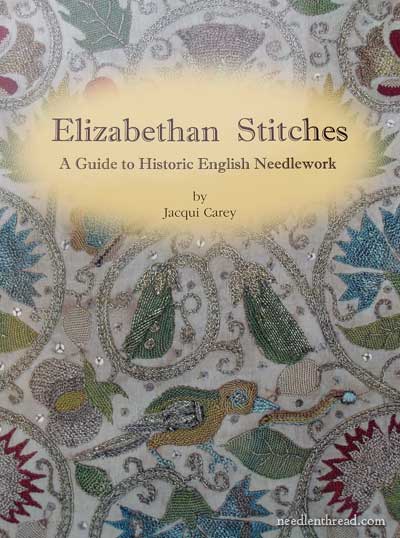
The book is the result of the author’s extensive study of historic pieces, and, as she notes in the introduction, her discovery of the discrepancies between the way stitches were actually worked on the 16th & 17th century artifacts she studied and the modern interpretations of these stitches. In the book, Carey sets out to illustrate the variety of stitches used in historic English needlework and their various ways of being executed.
The book, then, is both an instructional book on Elizabethan stitchery, with detailed trouble-shooting of the stitches and their variations, as well as a kind of treatise on the differences between Elizabethan stitchery and modern interpretations of Elizabethan stitchery.
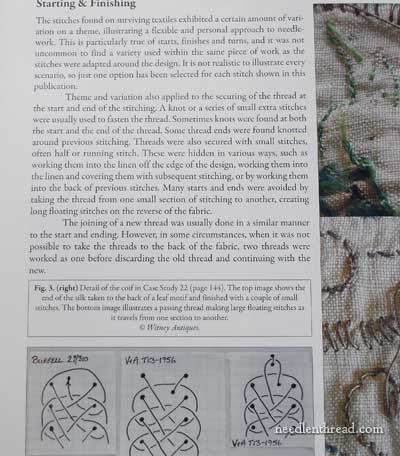
The book begins with introductory and background material. Before getting into the stitches themselves, the author offers some excellent reading material to help clarify Elizabethan embroidery and put it into perspective. There are a few sections at the beginning of the book that I especially like: the section on Needlework in general, with its explanation of terminology (nice to see!), of working methods, and of starting and finishing. I thought these sections well worth reading!
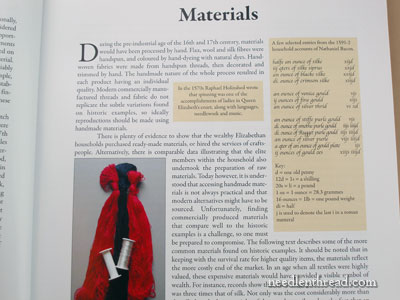
My favorite section at the beginning of the book, though, is the section on materials, their costs, availability, uses, types, and so forth.
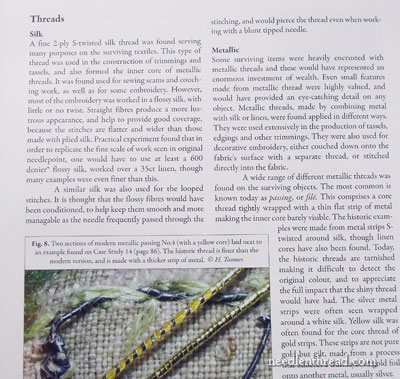
I love the close-up photos in this section, showing the various materials used and illustrating the difference between materials available today and those used in the 16th and 17th centuries. I think this section gives us a deeper appreciation of the materials that we do have access to today, and the skill, vision, and dedication of those involved in creating and recreating these materials for our use.
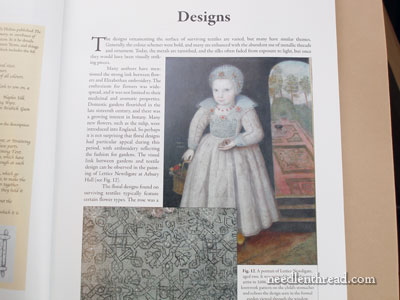
There’s a nice section on design and design sources at the beginning of the book, too. If you are dabbling with the idea of creating Your own Elizabethan embroidered masterpiece, it’s well worth reading!
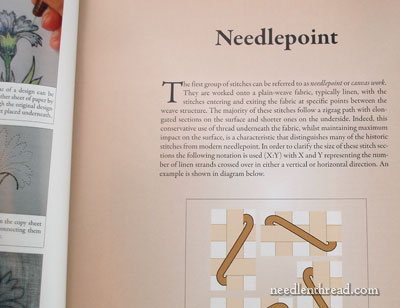
Then, it’s time to get into the meat o’ the matter: the stitches themselves. The arrangement of the book in the stitchery part is well done – I like the way this part of the book is laid out!
There are four categories of Elizabethan stitchery addressed: needlepoint, braid stitches, looped stitches, and applied work. The instructional part of the book is separated into these four types of stitchery.
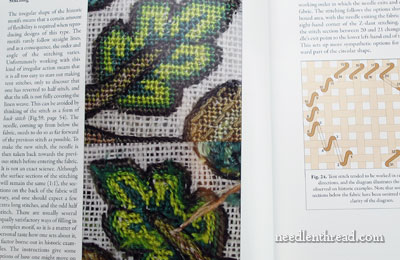
For each category of stitchery, the reader receives an explanation of how the stitches were used, up-close detail shots of the stitches on extant samples from the period (front and back, in most cases, which is very nice!), and diagrams demonstrating the working methods of the stitches.
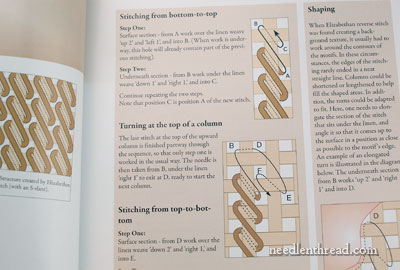
There are further diagrams illustrating the troublesome areas of certain types of stitches – for example, how to work the stitch if traveling in other directions, if turning, and so forth. Of course, the author could never study every single sample of Elizabethan embroidery and demonstrate the variations found. Instead, she illustrates the more prevalent approaches to executing the stitches and dealing with different stitching situations.
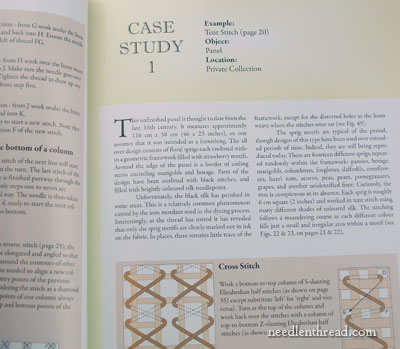
Then, after explaining the stitches that fall under the particular category, showing us examples, and teaching us how to do them, the author explores specific case studies – studies of museum pieces that employ the stitchery explored in that section of the book. Each of the case studies involves a narration by the author concerning the piece, what it looks like, the materials used, and so forth, and detailed close-up photos of the piece, often with further diagrams demonstrating how stitches were executed on that particular piece of embroidery.
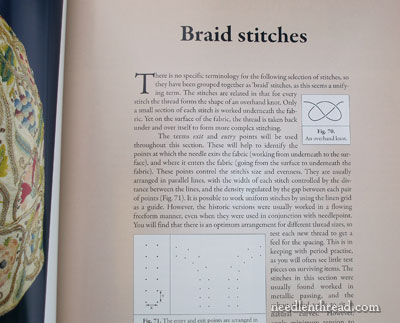
Each of the four sections of the main content area of Elizabethan Stitches is arranged this way: the explanation of the category; the stitches that belong to the category, broken down and illustrated with diagrams and specific trouble-shooting for difficulty areas; photos of museum pieces close-up and personal; and then the case studies, which often include further stitching instruction.
There are over 30 types of stitches and variations covered in detail this way. The quantity and thoroughness involved in exploring these stitches and variations, plus the detailed visual verification afforded by the extensive photos in the book, sets Elizabethan Stitches apart from, and well above, other books written on the subject of 16th and 17th century embroidery.
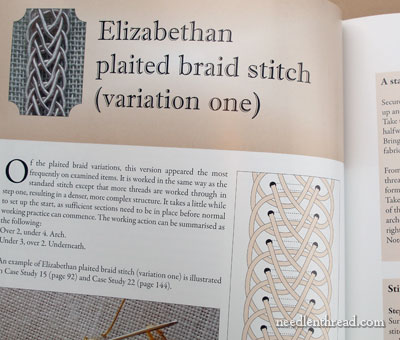
By the way, plaited braid stitch is offered with three variations, and if you are familiar with Jacqui Carey’s other book on Elizabethan sweet bags, I think you may find the instruction in Elizabethan Stitches a little easier to get a handle on. Comparing the two books, I find I prefer the instruction in this book better than the instruction in the previous book on Elizabeth sweet bags.
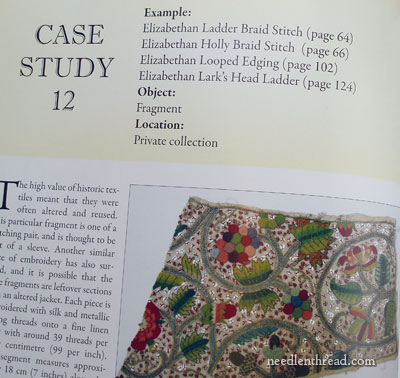
If you have even the slightest interest in historical needlework, by the way, you are just going to love the case studies throughout the book!
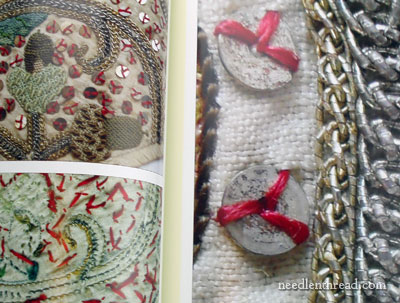
After all, most of us will never see these pieces in person, and certainly we will never see them this closely. The photos in the book are magnificent – really fun to gaze upon in awe and wonder!
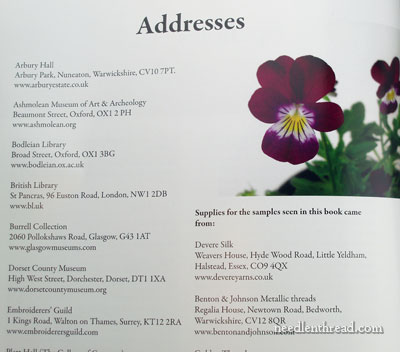
The book ends with a list of addresses, including museum addresses and supplier information. Handy to have!
The pros of the book are all laid out above! You won’t find another book like it, and if you have any interest in this type of needlework or in the use of historic techniques in modern applications, you don’t have much of a choice: you’ll need this book in your needlework library!
Where to Find It
You can find Elizabethan Stitches through the following book affiliates:
In the US, Elizabethan Stitches is available here through Amazon. Be sure to check the used books available in the listing, too, as they are definitely less expensive!
Worldwide with free shipping, Elizabethan Stitches is available here through the Book Depository.


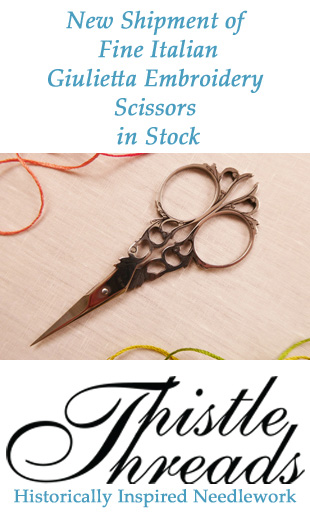
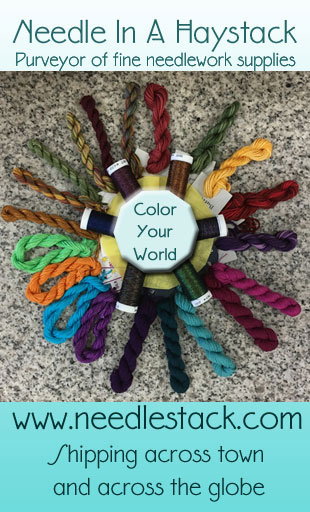

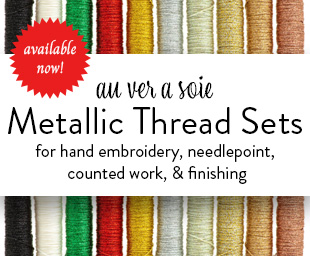
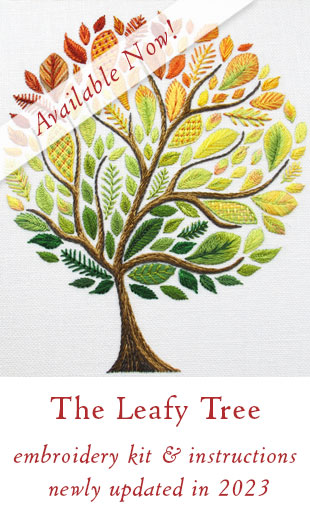
Wow. This book sounds fabulous. I agree that it belongs in every needleworker’s library, including mine. I am buying it.
Wow!!!
Thanks for the review Mary. I MUST have this book!!! Oh, and my birthday is in 2 weeks. HEHEHE
Mary,
I do so enjoy reading your thorough book reviews! This book looks particularly well done, and such intriguing subject matter. Thank you so much for bringing such books to our attention 🙂
Tomi Jane
I read about this book a couple of weeks ago (perhaps on this blog?) and knew I had to have it! I also ordered the Sweet Bags book too. I want to learn more about 17th C embroidery and look forward to seeing the closeup photos. My books are now making their way across the pond and can’t wait for them to arrive! Your review here assures me I made the right choice. Thanks so much for doing book reviews and giving us a peek inside the book too!
Alas, so many wonderful books…so little time…so little money. In my next life I shall be rich, start embroidery as a toddler, and have servants to do all the drunge work.
(I’d also like to be beautiful and thin.)
Thanks for the wonderful review.
Thanks for the detailed review! – and some tidbits to drool over until my copy arrives.
Now, my question is this…. How are so many people getting their copy before me?! : )
OMG DROOL!!!!!
G’day there Mary,
Well, it’s a corker alright. Just love everything about it. Always loved the Elizabethan embroidery colours and styles. Rich and elegant…which I’m certainly not. Maybe that’s why I’m attracted to them…something to dream on.
Anyway, thanks muchly for the beaut review and links. The Carey site is so interesting, including her story. What an amazing resource the net is. You were my introduction to this special world, so give yourself a pat on the back and a warm hug from me.
Thank you, and cheers Mary. Kath
Thanks Mary, I ordered it from http://www.bookdepository.co.uk, they have it for 25% discount and free shipping worldwide, so that was a really good deal on a brand new book!!!!
Oh my this is so tempting, but i’m so low on funds….sigh….i’ve bookmarked it and will think about it for a couple of days…..
Thank you for reviewing this book. I have it on my wish list and was waiting for its publication. So wonderful to hear that it is as good I as i hoped it would be. I can’t wait to get my hands on a copy!
T
Mary I have received my copy of Crewel Twists by Hazel Blomkamp and it is SENSATIONAL, thanks so much for the review Jeni J
Hi, I follow your blog a few months, really wanted to be able to acquire these wonderful books that I see there, but unfortunately does not exist in Brazil. How do I ask, if possible send me an email if possible on all or some books I buy and where it would be so nice if it had in Portuguese, because I can not speak in English. Here I am using the translator of google.
Kisses love your blog.
Rose
I just ordered this today from Jacqui Carey’s site after re-reading the review and determining that I really did have to have it. I also got lucky and got a copy of Crewel Twists from a dealer on amazon. I am looking forward to both.
I would love to hear what others think of them as well.
I ordered my copy from The Attic in Mesa, Arizona. It arrived yesterday. It is fabulous! The illustrations are amazing! I have the Sweetbag book and Elizabethan Stitches is a wonderful addition to my needlework library! I have just begun reading it. It is so worth the cost!
What a great review! I’ve already decided to buy this one (I help my family out by buying my Mother’s Day present in advance – well in advance this time!), but I’m wondering if it contains instructions for some ladder stitch variations that I’ve seen around such as zigzag wrapped bars on ladder stitch or Guilloche stitch on ladder stitch. I know that there is a marvelous sounding Masterclass available online with these stitches, but I’m expecting a baby soon so I don’t think now is the time to begin something so involved. I’m hoping to find the stitches in a book and tackle them later on.
Thanks Mary, I’ve just bought the book because of your review (a used copy, as it seems to be out of print now sadly). I’m attempting to design a historically accurate piece of blackwork with metal thread embellishment, and this book sounds like it’ll be really useful.
Also there really should be a hash tag #marymademebuyit because I also bought Tudor Textiles and a pair of Dovo scissors based on your blog articles!
LOL! Maybe you could start a hashtag trend!